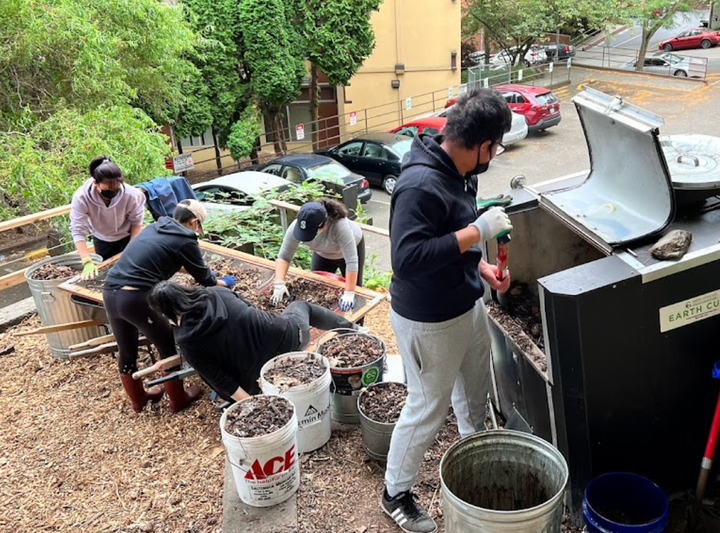As a child, Joycelyn Chui often helped her grandmother in the kitchen. She would separate eggshells and onion peels in little bowls, to compost them in her grandmother’s garden. For Chui, sorting and composting food waste with her grandmother planted a seed that has now germinated into Restaurant 2 Garden, a community composting project in Seattle’s Chinatown International District.
Restaurant 2 Garden is a hyperlocal organization that takes food waste from restaurants in Chinatown and converts it to compost for Danny Woo Community Garden—the only green space in the neighborhood. Elderly immigrants from Asian American and Pacific Islander communities cultivate the community garden, and grow foods relevant to the community, such as chrysanthemum and goji berries.
Restaurant 2 Garden is one example of recent statewide push to increase recycling and composting rates. Washington, along with California, is one of the first states to enact a sweeping set of policies targeted at organics and food waste to get food out of the garbage. Some of these measures are now being codified into law: House Bill 1799—passed in June of 2022—seeks a 75% reduction of organic material going to landfills by 2030, and a 20 percent increase in donations of edible food by 2025. These targets are a joint effort between local governments and the state. Cities and counties are now required to offer organics collection to businesses, if there is a facility available that can process organic waste. For businesses in areas with organics management, the statute calls for businesses to separate their organic waste and either subscribe to an organic waste collection service or process them on site.
Initiatives like Restaurant 2 Garden will be critical in helping make this legislation successful, says Heather Trim, executive director of Zero Waste Washington, a nonprofit that advocated for House Bill 1799.
“What usually happens is a business contracts with a private or a commercial hauler, and will pay for their material to be hauled to a commercial compost,” says Trim. “What Restaurant 2 Garden is doing is jumpstarting the little mom and pop shops and helping [composting] happen on a localized scale.”
Seattle already has industrial-level facilities that process compost, which can help keep nutrients from organic materials in circulation. But even though residents and businesses are required to separate food and paper for composting, a lot of food still ends up in the landfill.
“We know there’s a continued need for deeper engagement with our community to do a better job at keeping food out of the landfill,” says McKenna Morrigan, strategic advisor for waste prevention and product stewardship at Seattle Public Utilities.
Morrigan argues that community composting initiatives like Restaurant 2 Garden can help local businesses in culturally responsive ways, and support the circular economy—where materials are used as efficiently as possible and waste is recaptured.
“Our focus going forward is to support the circular economy for organics, which means doing our part to ensure that the city is purchasing compost made from the organics collected here, and that they’re being used in the many different applications where compost is beneficial,” adds Morrigan.
Compost can be used by the city for landscaping, amending soil, erosion control, stormwater filtration, and new construction. House Bill 1799 also requires local governments to use compost products in relevant projects and prioritize getting compost from places that produce it locally. All counties in Washington State will now be required to consider—in their growth plans—where compost facilities could be sited, and the bill aims to make it easier for compost facilities to obtain bank loans and grants so they can expand.
Back in Seattle, Restaurant 2 Garden currently works with two restaurants, both in close proximity to Danny Woo Community Garden. Since opening, it has collected over 5,000 pounds of food scraps and harvested a similar amount of compost. It’s not yet a fully closed loop: While community gardeners are using compost to grow food, the yield isn’t enough to provide food for restaurants.

But Chui and her co-founders—Elizabeth Chong Baskerville and Jennifer Cheung—are looking to expand to another plot of public land in the neighborhood. They want to build a demonstration site where people can see how food scraps are converted to compost, a process Chui sees as using public land to provide a public service.
She says the resourcefulness of her immigrant, refugee community deserves a lot more attention. “What modern-day ‘environmentalism’ is promoting, we’re already doing,” she says.
This story was produced in partnership with Communities of Opportunity, a growing partnership that believes every community can be a healthy, thriving community.




